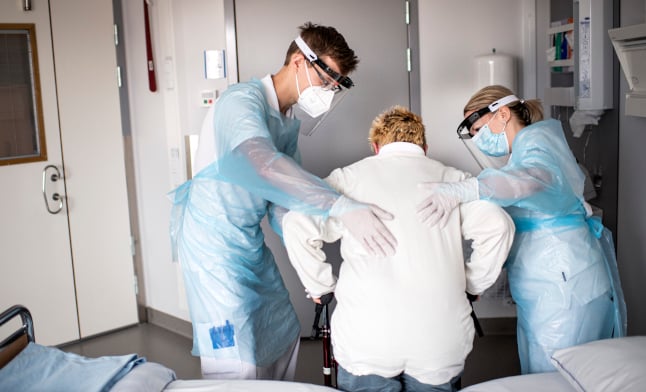62 days. 78 days. 90 days. Weeks, then months of being bed-ridden with a high fever and chest pains, out of breath from trying to grab a glass of water. A large, unknown number of Swedish residents are suffering from drawn-out cases of confirmed or suspected Covid-19.
Now, as journalist colleague Agnes Arpi and I can report in today's ETC daily newspaper, there's another factor to add to their mutual list of ailments: doctors brushing off their symptoms as anxiety or stress.
Swedish healthcare has a high overall standard. Indeed, many foreign residents (not least those coming from countries where specialist care is expensive or inaccessible) still extol the virtues of Sweden's mostly free healthcare, even though it has simultaneously fallen to the bottom of many international surveys.
A case in point: Before the pandemic, Sweden had the lowest number of available hospital beds relative to population in the entire European Union, something the Swedish Medical Association has slammed as “a disaster”.
There's also been a large increase in the time you have to wait for planned surgery. According to the so-called Vårdgarantin ('care guarantee'), the maximum waiting time is supposed to be 90 days. In 2019, almost a third of patients (29 percent) had waited longer than that – up from 12 percent in 2012.
But when the Swedish healthcare system works, it often works brilliantly. That's why this phenomenon is so shocking.

A temporary coronavirus testing tent set up outside Södertälje Hospital. Photo: Pontus Lundahl/TT
In Facebook groups for Covid sufferers and our extensive interviews, affected men and women of all ages and backgrounds share nightmarish stories of having their Covid symptoms ignored and put down to anxiety, stress or depression by the medical profession. One recent poster was even sent to the emergency psychiatric ward.
This in the middle of a pandemic now declared the worst global health emergency the WHO has ever faced. Many of the displayed symptoms should be well-known by doctors and nurses by now, and many are hard if not impossible to fake, such as low oxygen levels, fever and a lack of taste and smell.
“You just don't want to go to work, do you?” pre-school teacher Åsa was humiliatingly told by her local GP. “But I love my work,” she exclaims in our interview. “I even miss ‘my' kindergarten kids when I'm on holiday!”.
Another woman, a young Stockholm-based mother of two, was formally diagnosed with anxiety. After insisting for months, sometimes despairing and even agreeing to try online therapy at one point, she was finally allowed a lung x-ray examination. It turns out she was likely to have had several blood clots in one of her lungs (a well-reported sign of Covid-19). As one interviewed doctor admits, undiagnosed and untreated blood clots in the lungs could result in death.

Coronavirus antibody tests. Photo: Johan Nilsson/TT
Whether all of the numerous long-term sufferers can be proven infected or not is beside the point. For starters, the current antibody tests and the conclusions drawn from them have come under heavy criticism lately, as they seem to fail to pick up a sign of infection in those who fell ill at the beginning of the outbreak.
American scientists have even reported that the tests we have to make do with for now can fail to detect an ongoing infection. Many of those who've been sick for months have beaten the virus itself, but are suffering from the severe after-effects science is only just beginning to chart and understand, ranging from lingering tiredness to frightening neurological damage.
All of this means that the experience of patients should carry more weight than in normal, non-pandemic times. The Swedish medical profession needs to be humble in the face of this. They should admit that they're still learning about the virus, keep an open mind, and show empathy for the afflicted.
And here's the part where the individual resident in Sweden can make a difference.
Almost all of our interviewees tell us that they've hesitated seeking help because they didn't want to burden the Swedish healthcare system. Having seen the media's dramatic footage of people gasping for air hooked up on ventilators, they all reasoned that “well, I'm not actually dying, so I'll wait a little longer…”.
It's a sympathetic attitude, of course, but counter-productive. Better safe than sorry, especially now that our emergency wards aren't as strained as during the first stretch of the pandemic.
From a societal standpoint, it's a bad idea not to keep track of thousands of individuals who could be contagious. Every single person sent back to work like Åsa risks infecting several others, even starting a local cluster of Covid infections.
Thus, you could argue that it's your moral responsibility to get any symptoms of Covid-19 checked up. And if the doctor claims your headache, cough and high fever are probably just stress-related? Call the press – why not The Local.
Lisa Bjurwald is a Swedish journalist and author covering current affairs, culture and politics since the mid-1990s. Her latest work BB-krisen, on the Swedish maternity care crisis, was dubbed Best reportage book of 2019 by Aftonbladet daily newspaper. She is also an external columnist for The Local – read her columns here. Do you agree or disagree? Share your thoughts in the comments below.



 Please whitelist us to continue reading.
Please whitelist us to continue reading.
Member comments